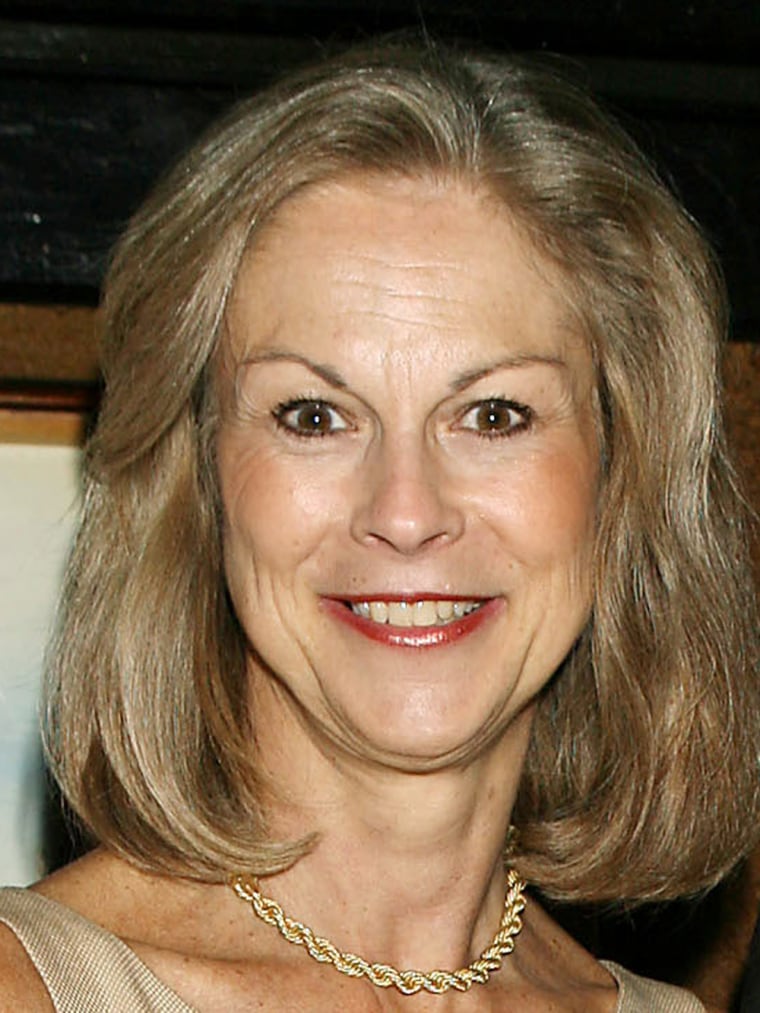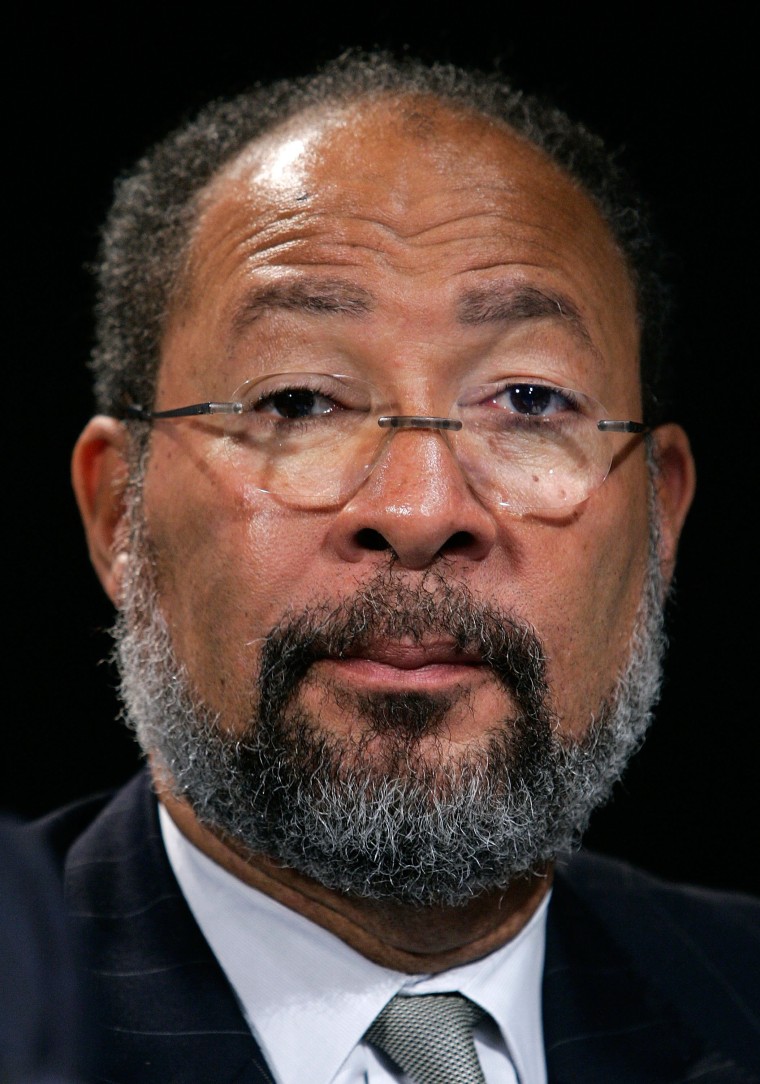There is no CEO guidebook that tells you how to become a leader. So how do men and women get to the corner office? By learning lessons as they go through life. Author and MSNBC.com contributor Eve Tahmincioglu interviewed more than 50 leaders for her new book, “From the Sandbox to the Corner Office,” asking them about lessons they learned from childhood to their early career days. Here’s an excerpt:
Chapter 1
Parents — Less Carrot, More Stick
Richard Parsons, CEO of Time Warner
Richard Parsons’ dad was the principal disciplinarian in his house and not one to think sparing the rod was a good idea, even giving the New York City school system permission to spank the young Parsons. His father used a switch from a tree for his childhood misdeeds because, Parsons believes, it would sting but not cause the kind of damage a belt might, for example. “I got more spankings than the other four kids together. I was always getting spanked, mainly because of misbehavior at school, for cutting up.”
He was also punished often in other ways. On one occasion, when he was 10, Parsons was caught shoplifting and his dad grounded him for a month for that offense. “Being grounded to me was terrible. I loved being outside.” When you did something wrong at the Parsons home, you paid for it.
But after one particularly terrible misdeed, when most parents would probably break under the enormity of a child’s action, his dad kept his restraint. At age 7, Parsons was playing with matches and burned the family home to the ground. His mother had to go to the hospital with minor burns after rushing into the house to save his younger siblings. No one was seriously hurt, but the family had to move in with grandparents for four months until the home was rebuilt. His dad’s response: “Don’t do it again.”
Parsons says his father “understood the gravity of the situation and he knew I understood it as well. You punish someone when you are trying to make a point, trying to drive it home or reinforce some sort of discipline, morality, or message. He had the sense that punishing me at the time would serve no purpose other than an expression of his outrage.”
When Parsons turned 13, his dad announced that the spankings and punishments would now stop. “It was almost like a religious experience,” he recalls. “He tells me, ‘Today you’re a man and I expect you to start acting like one.’ I more or less did,” he quips. “The experience was odd. I was thinking, ‘What’s different today?’ But that was my dad’s whole orientation. He looked at life as steps on stairs. I was moving a step up in the maturation process.”
And his father also subscribed to the “corral” method of parenting, not the lead-around-on-a-leash approach. He wanted his children to go out there and figure it out by themselves, even though they might bump into some fences now and then. For example, when Parsons was 16, he decided he wanted to go to the University of Hawaii instead of a college nearby. “My mother told my father, ‘Larry, we can’t let this 16-year-old go to Hawaii, for goodness’ sake.’ My father said, ‘Isabel, the boy wants to go to Hawaii. Let him go.’ ”
Parsons looks back on his youth with fondness, and believes he’s been able to succeed in his life because his parents loved him so deeply. His mother, who was a homemaker when he was growing up, would always take a job at the Ideal Toy Co. starting in late September working three nights a week going into the Christmas season so the parents would have extra money to buy gifts for the kids.
“It was just clear to me that both my parents were focused on my well-being, my happiness, my prospects for success, satisfaction, contentment,” he explains. “Love is an intangible thing. There are people who think they are loved by their parents but don’t feel it. I felt it.” That feeling of love he got from his parents has helped him as a leader because, he believes, “I never needed to be revered.”
Christie Hefner, CEO of Playboy Enterprises
Being the daughter of the original playboy had little influence on Christie Hefner growing up in Chicago and then Wilmette, Ill., in the 1950s. She was raised primarily by her mother, Millie, after the two parents divorced when Christie was four years old, and she saw her famous father Hugh only four or five times a year on special occasions such as holidays and birthdays. It was her mother’s influence that she believes made her the leader she is today, specifically when it comes to her selfconfidence.
Christie downplays the influence of her stepfather, who came on the scene when she was seven, saying only that “it wasn’t a happy marriage.” The core of her values and ideals, she says, came directly from her mother. “I got both my sense of confidence that I could go out in the world and do whatever I wanted and be successful and the tempering of that self-confidence with a set of manners and sensitivity from my mother.”
No matter the situation, she observed her mother being kind to the people around her and garnering respect from others as a result. And given that her mother was an English major in college who became an English teacher, she had a great love of reading and engendered that in her young daughter. Often Christie Hefner would be encouraged by her mother to read books way beyond her grade level and that gave her the confidence to read, absorb, and understand all sorts of materials.

“I remember I was in fifth grade and the teacher asked us to read a book and do a report. She had suggested 'The Yearling' by Marjorie Kinnan Rawlings, but we were also given the option to choose a different book if we wanted,” she explains. Hefner chose "The Child Buyer" by John Hersey, a science fiction novel and biting social commentary on a clone-producing education system. “It was a book my mother had given me to read, and it took my teacher aback when I told her my choice. I had to get permission to use the book for the report, and I think she may have even called my mother about it. I ended up getting an A.”
It was her mother’s belief in Hefner’s ability, that she could read or do anything, that shaped her self-pride. “It wasn’t about any seminal moments, but rather a lifetime of making me feel I could do anything I wanted,” she says. However, she maintains, “I never felt pushed in the sense of the proverbial stage mother syndrome, but I always felt supported and encouraged. Whether I was thinking about going to law school or going into politics or journalism, I never felt I had to choose a particular field to please either of my parents. It was all about finding what I wanted to do.”
Hefner made Phi Beta Kappa in her junior year and graduated from Brandeis University summa cum laude with a bachelor of arts degree in English and American literature in 1974. As for her relationship with her famous father, “In many ways my father and I didn’t have a typical relationship, not the least because I saw him rarely. But our mutual love of games brought us together, and the competitive streak that I inherited from my father is, in my view, a strength.”
Hugh Hefner, she says, was extremely competitive and did not subscribe to the notion that you let children win at games. The two loved games, everything from pinball to backgammon, and they both loved to win. “When I beat my father, which was rare, I knew I really beat him,” she recalls.
Excerpted from “From the Sandbox to the Corner Office: Lessons Learned on the Way to the Top" by Eve Tahmincioglu. Copyright ©2006 by Eve Tahmincioglu. Excerpted by permission of John Wiley & Sons. All rights reserved. No part of this excerpt may be reproduced or reprinted without permission in writing from the publisher.
